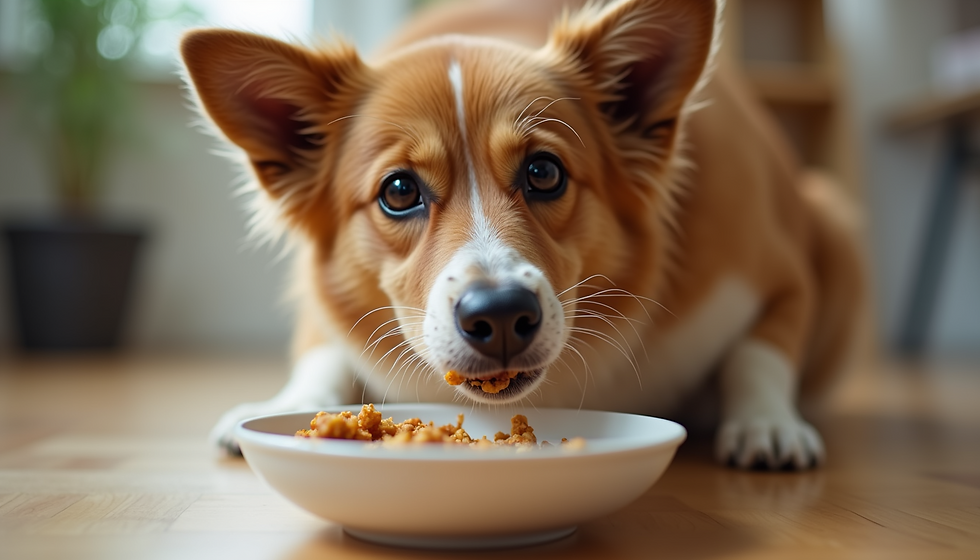How Your Dog’s Food Can Play a Big Role in Their Anxiety - Why nutrition should be part of your dog’s behavior plan
- Chelsea Judge
- Sep 1, 2025
- 2 min read
When it comes to addressing anxiety in dogs, training is often the first thing people think of — and it should be. But there's a major piece of the puzzle many dog owners overlook: your dog’s diet.
Just like people, dogs are deeply affected by what they eat. Imagine trying to help a child focus in school after giving them donuts and a Red Bull for breakfast. The sugar crash, energy spikes, mood swings, and inability to focus? It’s not hard to see how that would end in disaster. Now think about what you’re feeding your dog every day. Is it setting them up for calm, focused learning? Or is it sending their nervous system on a rollercoaster?
Processed Dog Food: The "Fast Food" of Pet Nutrition
Many commercial dog foods are packed with carbs, fillers, and artificial ingredients. These foods may be convenient, but they don’t provide balanced, sustainable energy. High-carb diets spike blood sugar, which the body quickly burns through, leading to crashes — just like with people. And when a dog’s nervous system is constantly swinging between highs and lows, it can make anxiety, reactivity, and even aggression worse.
Feeding your dog a highly processed, carbohydrate-heavy kibble is a lot like feeding a person fast food every day. Over time, it wears down the nervous system, disrupts hormone balance, and makes it harder to cope with stress.
Food and Behavior Are Connected
When I work with anxious or reactive dogs, I don’t just look at training techniques — I also look at what’s in their food bowl. Why? Because a well-fed brain is a calm brain. When your dog’s diet supports their physical and emotional health, training becomes easier and more effective.
Switching to a more balanced, species-appropriate diet — with quality proteins, healthy fats, and minimal fillers — can make a huge difference in your dog’s ability to regulate stress and respond to training. It’s not about a magic food that fixes everything overnight, but about setting up your dog for long-term success from the inside out.
What You Can Do
Check the ingredients: Avoid foods where corn, wheat, soy, or by-products are listed among the first ingredients.
Look for high-quality protein: Meat should be the star of the show, not grains.
Avoid artificial colors and preservatives: These can trigger behavioral issues in sensitive dogs.
Consider a fresh or raw diet: If it works for your lifestyle and your dog’s needs, many owners see dramatic improvements.
Final Thoughts
Training is essential — but it shouldn’t be the only tool you use. If your dog is struggling with anxiety, reactivity, or focus, take a good look at what’s fueling their body and brain. Just like people thrive on real, nourishing food, so do dogs. Nutrition is not a replacement for training, but it is a powerful partner in helping your dog feel and behave better. 📩 Want to learn more about how your dog’s diet could be affecting their behavior?
Send me a message today! I’m based in the Pacific Northwest, but available for Zoom consults anywhere.






Comments